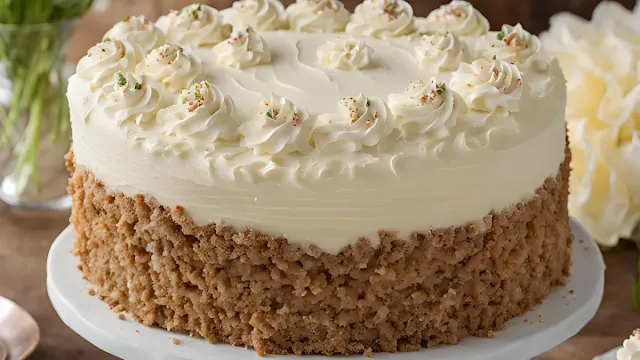Classic Vanilla Buttercream Frosted Cake
Creating a beautifully frosted cake is part science, part art, and completely achievable at home. This recipe walks you through creating a tender vanilla cake paired with silky buttercream frosting that rivals any professional bakery. Whether you're celebrating a special occasion or simply craving something sweet, this classic recipe will become your go-to.
Essential Tips for Success
- Room temperature ingredients are crucial
- Level and cool cakes completely before frosting
- Use a cake turntable for easier frosting
- Crumb coat before final frosting
Ingredients
For the Vanilla Cake:
- 3 cups all-purpose flour
- 2 1/2 teaspoons baking powder
- 1/2 teaspoon salt
- 1 cup unsalted butter, room temperature
- 2 cups granulated sugar
- 4 large eggs, room temperature
- 2 teaspoons pure vanilla extract
- 1 1/4 cups whole milk, room temperature
For the Buttercream Frosting:
- 1 1/2 cups unsalted butter, room temperature
- 6 cups powdered sugar
- 1/3 cup heavy cream
- 2 teaspoons pure vanilla extract
- 1/4 teaspoon salt
Instructions
For the Cake:
- Prepare
- Preheat oven to 350°F (175°C)
- Grease and line two 9-inch cake pans
- Sift together flour, baking powder, and salt
- Make the Batter
- Cream butter and sugar until light and fluffy (about 5 minutes)
- Add eggs one at a time, beating well after each
- Mix in vanilla extract
- Alternate adding flour mixture and milk, beginning and ending with flour
- Bake
- Divide batter between prepared pans
- Bake for 25-30 minutes until a toothpick comes out clean
- Cool in pans for 10 minutes, then remove to wire racks
For the Buttercream:
- Prepare the Frosting
- Beat butter until creamy (about 3 minutes)
- Gradually add powdered sugar
- Mix in cream, vanilla, and salt
- Beat until light and fluffy (5-7 minutes)
Assembly and Frosting:
- Level the Cakes
- Once completely cool, trim cake tops if domed
- Split each layer horizontally if desired
- Stack and Crumb Coat
- Place first layer on cake board
- Spread frosting between layers
- Apply thin crumb coat
- Chill for 15-20 minutes
- Final Frosting
- Apply final coat of frosting
- Smooth sides and top
- Decorate as desired
Pro Tips for Perfect Results
- Room Temperature Ingredients: This ensures everything combines smoothly and results in a tender cake.
- Proper Mixing: Don't overmix the batter once you start adding flour - this develops gluten and makes the cake tough.
- Even Layers: Use a scale to divide batter equally between pans.
- Smooth Frosting: Hold bench scraper vertically against cake while rotating turntable for perfect sides.
Frequently Asked Questions
Q: Why did my cake sink in the middle? A: Common causes include opening the oven door too soon, overmixing the batter, or expired leavening agents. Always test baking powder freshness before using.
Q: How do I prevent air bubbles in my frosting? A: Beat buttercream on low speed after incorporating ingredients, then mix by hand with a spatula to remove air bubbles. This creates a smoother finish.
Q: Can I make this ahead of time? A: Yes! Unfrosted cake layers can be wrapped and frozen for up to 2 months. Buttercream can be refrigerated for 1 week or frozen for 3 months.
Q: Why is my buttercream grainy? A: This usually happens when the powdered sugar isn't fully incorporated. Beat longer and add cream gradually until smooth.
Q: How do I transport a frosted cake? A: Chill the cake thoroughly first. Use a cake box or carrier, and keep it level during transport. Place non-slip mats under the cake board.
Q: Can I use salted butter? A: While possible, unsalted butter is preferred as it allows better control over the final taste. If using salted butter, omit additional salt.
Storage Tips
- Unfrosted layers: Wrap well in plastic wrap and store at room temperature for up to 2 days
- Frosted cake: Keeps at room temperature for 3-4 days covered
- Refrigerate if using perishable fillings or in warm weather
- Remove from refrigerator 2 hours before serving for best taste and texture
Variations
Flavors:
- Add almond extract for subtle nutty flavor
- Replace some vanilla with citrus zest
- Use different extracts in frosting
- Add food coloring for themed cakes
Decorating Ideas:
- Pipe rosettes around top edge
- Create textured sides with cake comb
- Add sprinkles or edible flowers
- Drip ganache for elegant finish
Troubleshooting Guide
Common Issues:
- Crumbly Cake
- Solution: Don't overbake; check doneness early
- Use room temperature ingredients
- Measure flour correctly (spoon and level)
- Buttercream Too Soft
- Solution: Add more powdered sugar
- Chill briefly if needed
- Avoid overbeating
- Uneven Layers
- Solution: Use cake strips around pans
- Rotate pans halfway through baking
- Level cakes when cool
Remember, creating a beautiful frosted cake takes practice. Don't be discouraged if your first attempt isn't perfect - even professional bakers started somewhere! Focus on technique and temperature control, and you'll be creating gorgeous cakes in no time.

